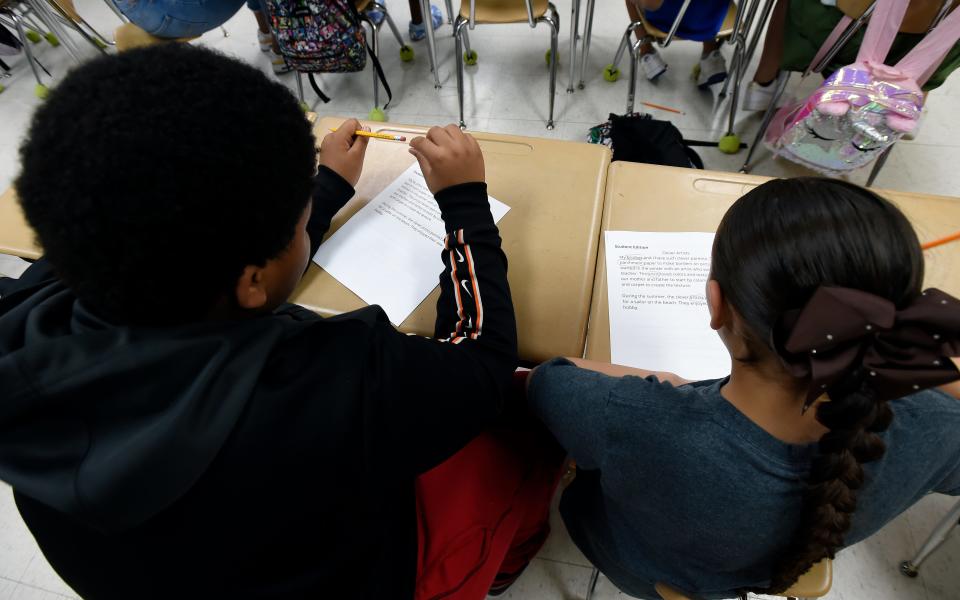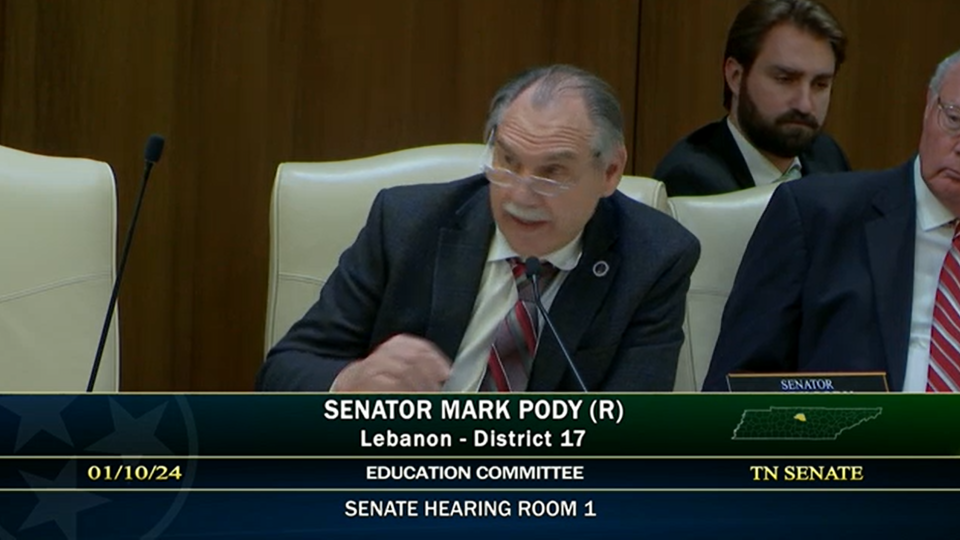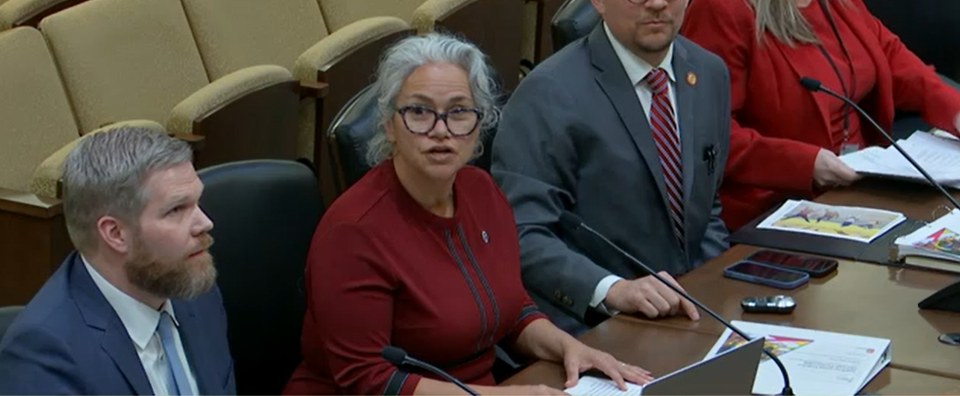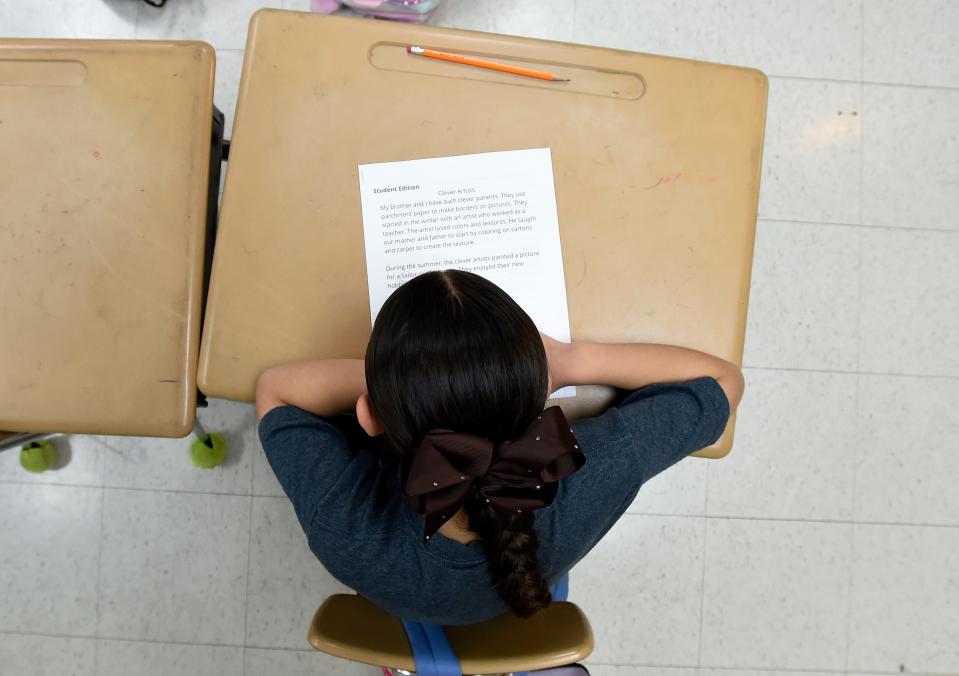Thousands of Tennessee 4th graders again face retention as lawmakers press for clarity
Thousands of Tennessee fourth graders who avoided being held back in third grade by opting into yearlong tutoring may again face retention this year.
An estimated 5,000-6,000 fourth graders may be retained this year as the ripple effects of a controversial third grade reading law continue, according to a model created by the Tennessee Department of Education. That would mark the second time those same students have faced retention in the span of one year.
Just 1.2% of Tennessee third graders — or about 900 students — were held back after the 2023 rollout of the reading law. If the education department's estimate holds up, that number will rise sharply. Out of the roughly 75,000 students who were third graders in the 2022-23 school year, anywhere between approximately 8-9% of them could ultimately be held back by the end of the current school year. That number includes the initial 1.2% along with the projected 5,000-6,000 more at risk in fourth grade.

Roughly 12,000 students opted for state-funded, high-dosage tutoring in fourth grade after falling short on a state reading benchmark last spring. To advance to fifth grade, they must must either pass the English language arts section of the state's standardized test or show "adequate growth" by the end of the school year. The formula for adequate growth includes the student's standardized test score along with the probability they will become proficient in reading by sophomore year.
However, that formula has not yet been finalized. The State Board of Education is expected to vote on its passage during its next quarterly meeting in February.
Dig deeper: Tennessee overhauled how it taught reading. There are signs it's working
Tennessee lawmakers press for clarity
Uncertainty around the definition of adequate growth, especially with standardized Tennessee Comprehensive Assessment Program tests quickly approaching, is a source of frustration among parents and lawmakers alike. Controversy over the third grade reading law also flared last spring as the results of the spring TCAP set off a fast-moving timeline of decisions for roughly 44,000 third graders who fell short.
"I almost feel that we're building this plane as we're flying it," state Sen. Mark Pody, R-Lebanon, said of the reading law and its ongoing effects during a Senate Education Committee meeting on Jan. 10. "I'm all for this accountability, and I voted for this (law) each time, but implementing it has been a problem."

Tennessee Education Commissioner Lizzette Reynolds, who took office in July, was on hand to discuss the reading law with the committee, among other topics. When it comes to shepherding third and fourth graders, she said, the department has worked hard to communicate data and next steps clearly. But she said some of that work is up to local districts, too.
"With all due respect, I would say that ... yes, we have a responsibility, but so do our districts," Reynolds said. "Part of that is continuing to communicate. We've done as much communication as we can, but we can't always do their job."

Pody pushed back at that notion, saying it's sometimes taken him months to get answers to questions his constituents have asked him about the third grade reading law. However, he acknowledged that things have improved since Reynolds took office.
Pody also said districts can't tell parents of fourth graders what their individual adequate growth goals are until the State Board of Education finalizes — and possibly amends — that formula next month.
Will there be more options for fourth graders to avoid retention?
Beyond being retained, the third grade reading law does not specify what happens to fourth graders who complete tutoring but still fail to reach proficiency or show adequate growth. State Rep. Mark White, R-Memphis, who chairs the education administration committee for the House, told The Tennessean he hopes to bring clarity on that matter.
Under the current law, third graders who fall short of the state reading benchmark can avoid being held back if they qualify for exemptions, pass on a retake, win an appeal, show adequate growth in summer school or opt for tutoring during fourth grade. An amendment to the reading law also factored in how students score on universal reading screeners given periodically throughout the school year.

White wants to explore whether similar rules could apply for fourth graders who miss the mark on the spring TCAP. Last year, results for the English language arts portion of the TCAP were expedited for third graders. They were released to districts May 19, which fell near the last day of school for most districts.
"If we run up to May, and the law is the law without clarity, then we have done ourselves an injustice," White said.
A comparison: Third grade reading laws are a mixed bag in the US. Here's what other states have learned.
How students fared amid Tennessee third grade reading law rollout
As Tennessee's third grade reading law rolled out last spring, 60% of third graders who took the TCAP did not meet proficiency on its English language arts section. That group of roughly 44,000 children faced the possibility of being held back.
Aside from those who were retained, here's how how the rest advanced:
Qualified for and enrolled in tutoring for fourth grade: 12,056 / 16.13%
Disability or suspected disability that impacts reading (exemption): 10,620 / 14.21%
Parental appeal approved: 7,146 / 9.56%
Passed on a TCAP retake: 3,344 / 4.7%
English learner with less than two years of English language arts instruction (exemption): 2,712 / 3.63%
Met other exemptions determined locally: 2,314 / 3.1%
Previously held back (exemption): 2,119 / 2.84%
Showed adequate growth in summer programming: 1,532 / 2.05%

Third grade reading proficiency is seen by some experts as a predictor of a student's future success. Research links it to things like academic achievement, high school dropout rates, college and career readiness, and college enrollment and retention.
Supporters of the reading law, passed in the wake of the coronavirus pandemic, say it's necessary in the push to boost flagging literacy rates in Tennessee and adds critical supports for school districts and students who are struggling. Critics say it is unfair, punitive and relies too heavily on a standardized test score, which many argue is not an accurate measure of reading proficiency.
'Not a reading proficiency test': TN parents, experts question TCAP use in third grade law
What's next for Tennessee third and fourth graders
While White has not yet proposed legislation, he is eager to get back to work after winter weather canceled the second week of the legislative session. He said he's had conversations over the last few months with fellow lawmakers and education leaders and hopes to bring clarity for schools, students and families as soon as possible.
Here are a few key dates coming up:
Jan. 22: Lawmakers are slated to return to the state Capitol.
Feb. 16: The State Board of Education is expected to vote on the adequate growth formula for fourth graders during its regular quarterly meeting.
April 15-30: TCAP testing for grades 3-5 will take place statewide.
In an email to The Tennessean on Jan. 19, the state department of education said its estimate that 5,000-6,000 fourth graders may face retention this year still stands.
"However, we acknowledge that we do not have a complete data model as we've not yet implemented this phase or portion of the law," the department said in the email. "Of course, that will be different as we implement for the first time and continuously improve over time, but the important takeaway is that there is a large number of students for whom growth must be checked."
More information on Tennessee's third grade reading law can be found at tn.gov/education/learning-acceleration.
Reach reporter Rachel Wegner at RAwegner@tennessean.com or follow her on Twitter, Threads and Bluesky @RachelAnnWegner.
This article originally appeared on Nashville Tennessean: Thousands of Tennessee 4th graders may again face being held back

